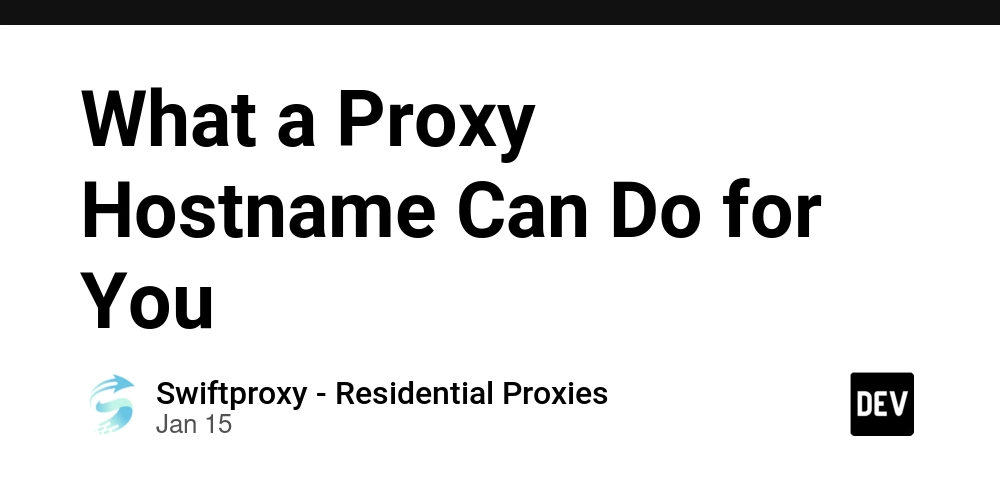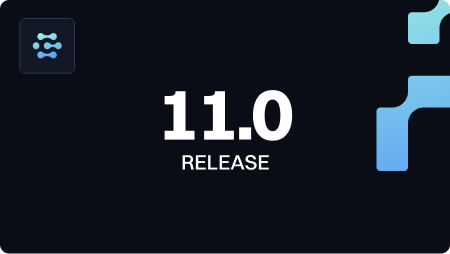What a Proxy Hostname Can Do for You
The internet is a powerful tool—but it’s not without its risks. Every time you browse, you send a trail of data behind you. What if you could take control of that trail, enhance your security, access more content, and even speed things up? Proxy hostnames are the solution—and understanding them could change the way you browse forever. What’s a Proxy Hostname and Why Does It Matter Picture this: You send a request to a website, but instead of your computer talking directly to the site, a proxy hostname steps in. It's like a middleman who forwards the request for you. This simple action hides your real IP address, encrypts your connection, and keeps your data secure. It’s privacy in action. Why does this matter? Because proxies help you bypass geo-blocks, mask your location, and protect sensitive data. It’s a tool you don’t realize you need—until you see the difference it makes. The Function of a Proxy Hostname It’s simple. Once you configure your device to use a proxy, your traffic flows through the proxy server first. The server then forwards your request, masking your IP address in the process. It appears as if you are browsing from a different location. The key benefit is encryption. Every piece of data transmitted through the proxy is wrapped in an extra layer of security, protecting you from prying eyes and keeping your browsing activity private. The Anatomy of a Proxy Hostname A proxy hostname consists of two things: 1. The Proxy Server: This routes your internet traffic and keeps things private. 2. The Hostname: The address of the server—either an IP or domain name. When you configure your device to use the proxy, it communicates with the hostname, routing traffic through the server. This extra step doesn’t just protect your privacy; it stops websites from directly connecting with your device, making it harder to track your browsing history. Public and Private Proxies Compared You’ve got options. Public Proxies Open to everyone. Quick and easy for casual, anonymous browsing or bypassing geo-blocks. Not ideal for sensitive data—these servers are shared, which can compromise your privacy. Private Proxies Exclusive to one user or organization. Offer better security, faster speeds, and more privacy. Great for businesses or anyone who needs consistent, reliable internet speeds without the risk of data exposure. If you’re handling sensitive information, go private. It’s the safest bet. The Benefits of Using a Proxy Hostname The biggest draw of proxy hostnames? They give you the freedom to access blocked content. Need to access a service restricted in your region? A proxy can get you there by masking your real location. But it doesn’t stop there. Faster Speeds for Static Content Some proxies cache commonly accessed content, speeding up load times for static sites. While this won’t magically fix a slow connection, it can help improve performance for frequently visited websites. Reduce Bandwidth Use Proxies can also cache data and compress content, reducing your bandwidth usage. This can come in handy in environments where multiple users share a connection. The Downsides of Proxy Hostnames Like any tool, proxies come with their own set of challenges. First off, when you’re routing your data through a third-party server, you're putting your trust in the provider. Always choose a reputable service. Look at their privacy policies and how committed they are to keeping your data safe. Also, be mindful of connection issues. Since your data is passing through an intermediary server, there’s always the risk that the server might become overloaded. Good providers address this by offering multiple servers, but it's something to keep an eye on. And don’t forget: Some websites can detect and block proxy usage, especially if you're trying to bypass region restrictions. In such cases, having an alternative solution can help you get past these barriers. Wrapping Up Proxy hostnames aren’t just for tech enthusiasts—they’re practical tools for anyone who values online privacy, wants faster browsing speeds, or needs to bypass content restrictions. By understanding how proxies work and choosing the right type, you can take full control of your internet experience.

The internet is a powerful tool—but it’s not without its risks. Every time you browse, you send a trail of data behind you. What if you could take control of that trail, enhance your security, access more content, and even speed things up? Proxy hostnames are the solution—and understanding them could change the way you browse forever.
What’s a Proxy Hostname and Why Does It Matter
Picture this: You send a request to a website, but instead of your computer talking directly to the site, a proxy hostname steps in. It's like a middleman who forwards the request for you. This simple action hides your real IP address, encrypts your connection, and keeps your data secure. It’s privacy in action.
Why does this matter? Because proxies help you bypass geo-blocks, mask your location, and protect sensitive data. It’s a tool you don’t realize you need—until you see the difference it makes.
The Function of a Proxy Hostname
It’s simple. Once you configure your device to use a proxy, your traffic flows through the proxy server first. The server then forwards your request, masking your IP address in the process. It appears as if you are browsing from a different location.
The key benefit is encryption. Every piece of data transmitted through the proxy is wrapped in an extra layer of security, protecting you from prying eyes and keeping your browsing activity private.
The Anatomy of a Proxy Hostname
A proxy hostname consists of two things:
1. The Proxy Server: This routes your internet traffic and keeps things private.
2. The Hostname: The address of the server—either an IP or domain name.
When you configure your device to use the proxy, it communicates with the hostname, routing traffic through the server. This extra step doesn’t just protect your privacy; it stops websites from directly connecting with your device, making it harder to track your browsing history.
Public and Private Proxies Compared
You’ve got options.
Public Proxies
Open to everyone.
Quick and easy for casual, anonymous browsing or bypassing geo-blocks.
Not ideal for sensitive data—these servers are shared, which can compromise your privacy.
Private Proxies
Exclusive to one user or organization.
Offer better security, faster speeds, and more privacy.
Great for businesses or anyone who needs consistent, reliable internet speeds without the risk of data exposure.
If you’re handling sensitive information, go private. It’s the safest bet.
The Benefits of Using a Proxy Hostname
The biggest draw of proxy hostnames? They give you the freedom to access blocked content. Need to access a service restricted in your region? A proxy can get you there by masking your real location. But it doesn’t stop there.
Faster Speeds for Static Content
Some proxies cache commonly accessed content, speeding up load times for static sites. While this won’t magically fix a slow connection, it can help improve performance for frequently visited websites.
Reduce Bandwidth Use
Proxies can also cache data and compress content, reducing your bandwidth usage. This can come in handy in environments where multiple users share a connection.
The Downsides of Proxy Hostnames
Like any tool, proxies come with their own set of challenges. First off, when you’re routing your data through a third-party server, you're putting your trust in the provider. Always choose a reputable service. Look at their privacy policies and how committed they are to keeping your data safe.
Also, be mindful of connection issues. Since your data is passing through an intermediary server, there’s always the risk that the server might become overloaded. Good providers address this by offering multiple servers, but it's something to keep an eye on.
And don’t forget: Some websites can detect and block proxy usage, especially if you're trying to bypass region restrictions. In such cases, having an alternative solution can help you get past these barriers.
Wrapping Up
Proxy hostnames aren’t just for tech enthusiasts—they’re practical tools for anyone who values online privacy, wants faster browsing speeds, or needs to bypass content restrictions. By understanding how proxies work and choosing the right type, you can take full control of your internet experience.


















